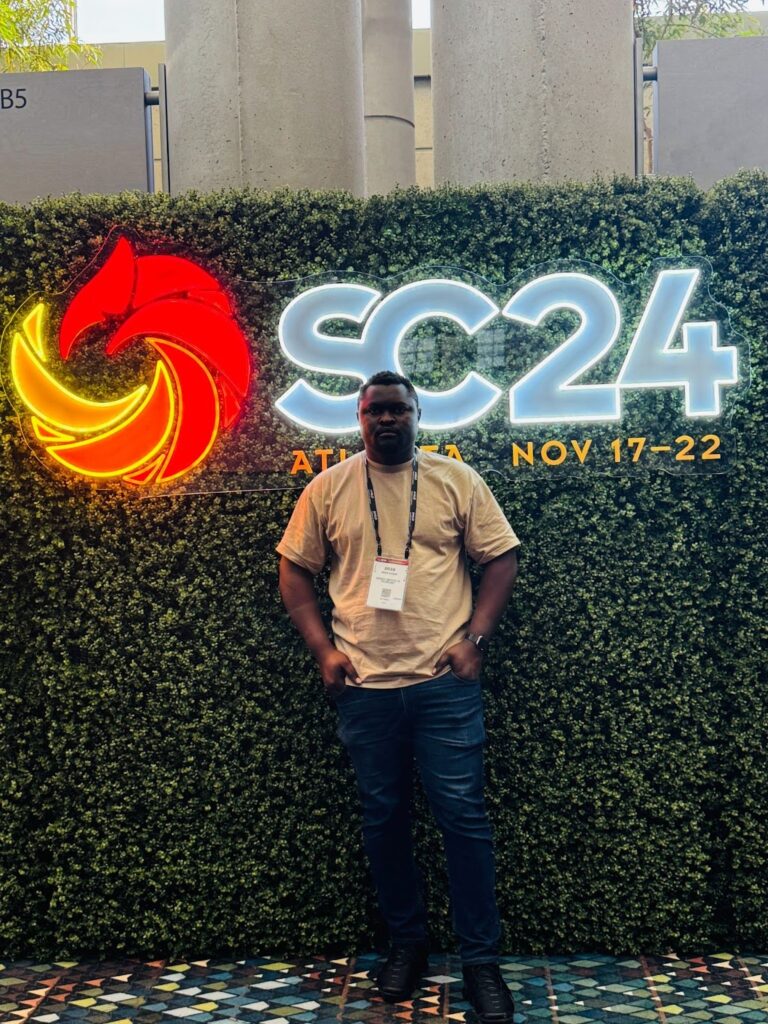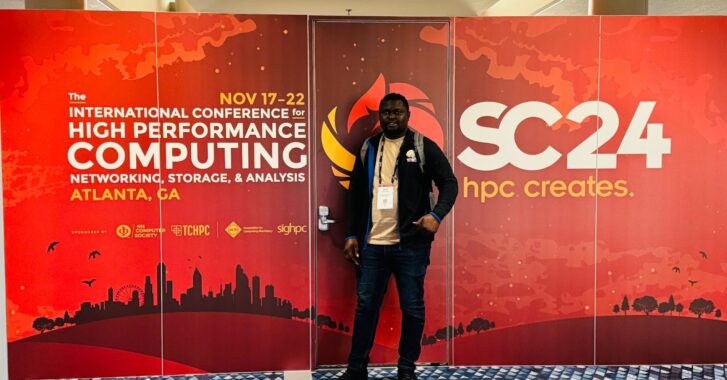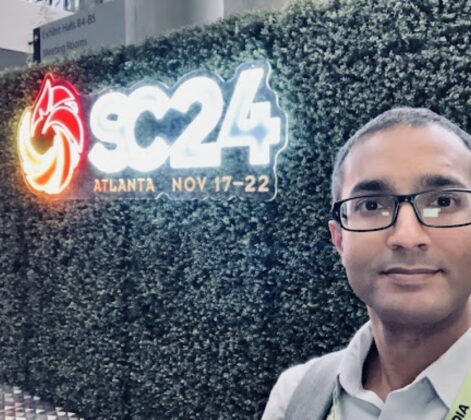by Brian Kyanjo (Georgia Institute of Technology Postdoctoral Scholar)
I was privileged to be part of the ART@SC24 jetlag day preparations and the overall SC24 conference. This event was more than just a gathering—it was a transformative experience that blended innovation, collaboration, and cultural exploration, leaving a lasting impact on my professional and personal growth.
The journey to SC24 began in July 2024, with brainstorming sessions and early planning. Weekly Wednesday meetings were dedicated to fine-tuning the details, from vendor coordination to venue arrangements, ensuring the event would be as engaging and colorful as possible. Months of preparation culminated on November 8th, marking the start of an extraordinary experience, thanks to Bryan Johnston, John Poole, Elizabeth Leake, and Hannah Moon.
The first day kicked off with reconnecting with colleagues from the HPC ecosystem across southern and eastern Africa. I also had the unique opportunity to meet speakers at my home institution (Georgia Institute of Technology), people I had never interacted with in person despite actively working within the same circles at the same institution, and others from other institutions, including Mississippi State University and Clemson University. The day was filled with engaging talks on high-performance computing (HPC) and related fields.
I was particularly excited to present my research on “Data Assimilation in Ice-Sheet Modeling,” showcasing how HPC technologies are integral to advancing this field. The presentation not only allowed me to share my work but also opened up conversations with attendees interested in its applications, sparking potential collaborations.
Insightful presentations from invited speakers dominated the second day, exploring strategies and advancements in HPC. A highlight was meeting individuals who managed Lengua, the HPC center where I ran simulations during my MSc in 2020 at the African Institute for Mathematical Science (AIMS), Rwanda. Reflecting on that experience, I am deeply grateful for their support, which provided access to computational resources that shaped the trajectory of my academic and professional career. This exposure ignited my passion for HPC and laid the foundation for my Ph.D. research at Boise State University. It was inspiring to reconnect with those who had played a role in my early journey.
The day ended with a visit to Medieval Times, a cultural and historical adventure that brought the past to life. Witnessing reenactments of battles, traditions, and practices from long-ago kingdoms was a unique experience—something I had only seen in movies. The authenticity of the performances was captivating and added a touch of fun to the day.
The third day marked the official opening of SC24, which featured workshops, tutorials, and exhibitions. One standout for me was the Python with OpenMP (PyOMP) tutorial. This session was a game-changer, addressing a challenge I had been grappling with for months.
My research requires parallelizing a Python-based data assimilation package. While I explored options like rewriting routines in C with OpenMP or MPI, funding and usage constraints made this approach impractical. I had experimented with Dask, Ray, and Cython, which yielded some speedups but fell short of expectations. The PyOMP tutorial introduced a method to bypass Python’s Global Interpreter Lock (GIL) without needing Cython, enabling effective parallelism directly in Python. That same night, I implemented the approach, achieving substantial speedups comparable to OpenMP in C. This breakthrough saved me significant time and effort and has since become a cornerstone of my workflow.
SC24’s exhibition floor was a hub of innovation, featuring hundreds of prominent technology companies and academic institutions, including Google, Amazon, Dell, Nvidia, Intel, AMD, Georgia Tech, Texas A&M, Mississippi State University, and the Texas Advanced Computing Center (TACC). These organizations showcased their latest advancements in HPC with interactive booth sessions, talks, and demonstrations.
The atmosphere was electric, with many companies offering giveaways, souvenirs, and raffles, making the experience both educational and enjoyable. Engaging with these exhibits allowed me to expand my knowledge of cutting-edge technologies, many of which had publicly available repositories on GitHub. I enthusiastically forked several projects for future exploration and potential contributions.
Networking opportunities were abundant. I connected with peers, experts, and leaders in the field, building relationships that will undoubtedly shape my career. The diverse array of people and technologies on display reinforced the value of community-driven innovation and collaboration in HPC.
I am immensely grateful to Elizabeth Leake, STEM-Trek and Texas A&M University, the supercomputing community, and all the funders who made this experience possible. Being fully funded, the conference allowed me to focus entirely on learning, networking, and contributing.
SC24 is more than an event—it’s a convergence of people, ideas, and opportunities that fosters growth on every level. The sheer scale of resources, expertise, and enthusiasm involved makes it a must-attend for anyone in the HPC ecosystem. I left the conference inspired, with new connections, fresh insights, and a reinvigorated passion for my work.
As I reflect on my time at SC24, I am reminded of the power of collaboration and the impact of being part of a vibrant, forward-thinking community. I look forward to returning to future iterations of SC and continuing to contribute to this dynamic field.





